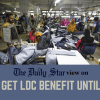Devise strategy for extension of post-LDC benefits

Bangladesh should devise a strategy for the upcoming 13th WTO Ministerial Conference so that it can push for the retention of its trade benefits as a least developed country for three years past the LDC graduation in 2026, said an economist yesterday.
Bangladesh is scheduled to gain the United Nations-declared status of a developing nation on November 24 in 2026 and is seeking the trade benefit extension to be attuned to the status.
Commerce ministers of member states are scheduled to attend the World Trade Organization (WTO) conference in Abu Dhabi between February 26 and 29 to adopt a raft of important decisions pertaining to global trade and commerce.
According to the declaration of the 12th conference held in Geneva in 2022, the WTO last October decided to extend the trade benefits for graduating LDCs but the roadmap is expected to be finalised in the 13th conference.
The European Union, the United Kingdom, Australia and Canada have already announced that they would continue providing the LDC trade benefits up to 2029.
The 13th conference will be effective and meaningful for Bangladesh, said Mustafizur Rahman, a distinguished fellow of the Centre for Policy Dialogue (CPD).
The country should take serious preparation for realising its demand for the trade benefit extension, he said.
There is a scope for the extension, and it could even come about through bilateral negotiation if Bangladesh wants, he said.
The US is opposing the extension as it has no LDC scheme in its trade policy, said Rahman.
In such a situation, Bangladesh can join groups of other countries, such as that having India which has some similar demands, he said.
India has been raising its voice over the last few years for the continuation of subsidies for factories housed inside exclusive economic zones, he said.
India has also been advocating for the continuation of a green agricultural subsidy and working for the sustainable use of marine resources and a moratorium on e-commerce, said the economist.
However, Bangladesh should bring about reforms and prepare for the graduation as the country has already met all three prerequisites, he said.
One of the preparation necessities was the fact that due to the graduation, Bangladesh would not be able to enjoy the benefits of a WTO agreement on Trade-Related Aspects of Intellectual Property Rights (TRIPs), he said.
Word is going round that the country will enjoy the benefits up to January 2033, which was totally untrue, he said.
Earlier, Bangladesh joined its peers who, as a group led by Chad, were seeking the extension. In 2020, the group sought 12 years and gradually reduced the demand to nine years and then to six years before finally settling at three years.
However, Rahman questioned whether the three years would truly come to benefit Bangladesh.
He was addressing a knowledge-sharing session on "13th Ministerial Conference of the WTO: What are the stakes for Bangladesh?" organised by the Research and Policy Integration for Development (RAPID) at Jatiya Press Club in Dhaka.
The 13th conference is important for two reasons -- geopolitical tension and a gradual decline in global trade, said RAPID Chairman MA Razzaque.
He suggested bringing about reforms in the WTO dispute settlement mechanism, saying it was now almost non-functional although it used to work for realising the rights of the LDCs.
Sharifa Khan, former senior secretary to the Economic Relations Division, expressed hope that the extension would come about.
Off-patent medicine, meaning that on which there are no exclusive marketing rights, comprised 98 percent of the drugs being made locally, she said.
So, there will be no problem for Bangladesh even if it becomes ineligible for the TRIPs, she added.
The key topics for discussion at the 13th conference are fisheries subsidies, e-commerce, WTO reforms, agriculture and measures for the LDC graduation, said Mostafa Abid Khan, a former member of the Bangladesh Trade and Tariff Commission.
If Bangladesh puts in the effort, it might be possible to attain the extension, said Mashiur Rahman, economic affairs adviser to the prime minister.
He also called for higher utilisation of resources of the blue economy.
Previously a lot of discussions used to take place at the WTO but now the multilateral discussion had declined, said Shawkat Hossain Masum, head of online at Bangla daily Prothom Alo.
Asjadul Kibria, planning editor of The Financial Express, also shared his experiences over WTO negotiations.

 For all latest news, follow The Daily Star's Google News channel.
For all latest news, follow The Daily Star's Google News channel. 




Comments